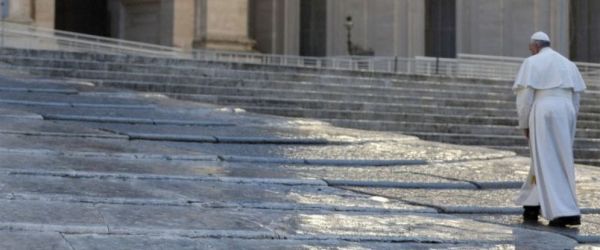After the Last Supper, the Lord, “lifted up his eyes to heaven and said, ‘Father, the hour has come; glorify thy Son’” — and then — “glorify thou me in thy own presence with the glory which I had with thee before the world was made” (Jn 17:1-5). Jesus asks for glory, a request which seems a paradox as his Passion is imminent. What glory is he referring to? In the Bible, glory refers to God’s self-revelation. It is the distinctive sign of his saving presence among mankind. Now, Jesus is the One who definitively manifests God’s presence and salvation. And he does this at Easter: lifted up on the Cross, he is glorified (cf. Jn 12:23-33). There, God finally reveals his glory: he removes the last veil and astonishes us as never before. Indeed, we discover that the Glory of God is entirely love: pure, unbridled and inconceivable love, beyond every limit and measure.
Brothers and sisters, let us make Jesus’ prayer our own: let us ask the Father to remove the veil from our eyes, so that in looking at the Crucifix over these days, we may understand that God is love. How often do we imagine him as master and not as Father; how often do we think of him as an austere judge rather than a merciful Saviour! But at Easter, God voids the distances, revealing himself in the humility of a love that seeks our love. Thus, we give him glory when we live whatever we do with love, when we do everything from our heart, as if for him (Col 3:17).
True glory is the glory of love because it is the only kind that gives life to the world. This glory is certainly the opposite of worldly glory, which comes from being admired, praised, acclaimed: when the ‘I’ is at the centre of attention. The Glory of God, on the other hand, is paradoxical: no applause, no audience. At the centre is not the ‘I’, but rather the other. Indeed, at Easter we see that the Father glorifies the Son as the Son glorifies the Father. No one glorifies him- or herself. We can ask ourselves today: “which glory do I live for? Mine or God’s? Do I wish only to receive from others or also to give to others?”.
[Pope Francis, General Audience 17 April 2019]












